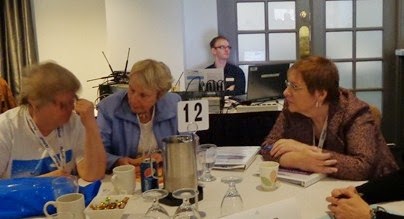Dr Marek at the round table discussion
The practical advice she is able to give because of her experience as a clinical pharmacist specializing in dental pharmacotherapy can immediately be put to use. She explained to us how modification of lifestyle, medication administration and careful selection of over-the-counter products may lessen dry mouth symptoms and improve oral health and comfort.
She talked about how easy it is to overuse lip balm. She suggested that if it really worked well it would be impossible to sell as much - this design flaw is deliberate. The best product to use for dry lips is one that contains HPA modified lanolin. One product you can use is Lansinoh. It is sold as a product for use by nursing mothers so can be found at many drug stores as an over the counter purchase.
Don't hang your lips out to dry
It is also a good idea to protect your lips in cold weather by using a scarf and also to make sure there is enough moisture in the air by using a cool mist humidifier. You need a sunscreen in your lip balm because you need to protect the thin and sensitive outer layer. It's a good idea to stock up in summer since it is a seasonal product.
There are over 500 medications that can affect oral dryness (xerogenic agents). These include antihistamines, antihypertensives, opiods, muscle relaxants and psychotropics such as antidepressants and antipsychotics. For the antihistamines she pointed out that products containing diphenhydramine (like Benedryl) are more drying than those which contain loratidine (like Claritin)
If you need to take a medication that has a drying effect sometimes taking a smaller dose, or perhaps a lower dose more frequently will help. Many healthcare providers are not aware of the incidence of dryness with certain drugs. Pharmacists are good resources for this information but of course you should consult your doctor about changes in medication dosages.
All stimulants are drying - this includes caffeine. Most of us are unaware of the amount of caffeine we consume. If you decide not to drink any more beverages with caffeine go slowly - caffeine withdrawal will occur if you stop suddenly. Even gradually reducing the amount by 10% a week can help you.
I was surprised to learn that only added caffeine must be listed on labels in the US. If a product naturally contains caffeine the amount is not listed. Look for guarana, yerba mate, chocolate or coffee flavoured foods - they will contain caffeine. Even energy gummy bears have caffeine.
From Vat19.com
Other things to avoid are alcohol-containing mouth rinses, acidic foods and beverages and toothpaste that contains SLS (sodium lauryl sulfate) which can cause tenderness and ulceration in the mouth.
According to a 2011 Cochrane review there is no strong evidence that any topical therapy is effective for relieving dry mouth. Oxygenated glycerol triester (OGT) spray is more effective than an electrolyte spray.
In some studies chewing gum was the preferred product of patients. Chewing does stimulate saliva flow: the best gum choice is sugar free and contains xylitol or a xylitol/sorbitol mix. Cinnamon and strong flavours should be avoided
Another suggestion was MI Paste, especially at night, to give a good slick feeling in the mouth.
Dr Marek also said "The burn is bad." If what you are eating or chewing gives you a burning sensation in your mouth, it's best that you avoid it.



No comments:
Post a Comment